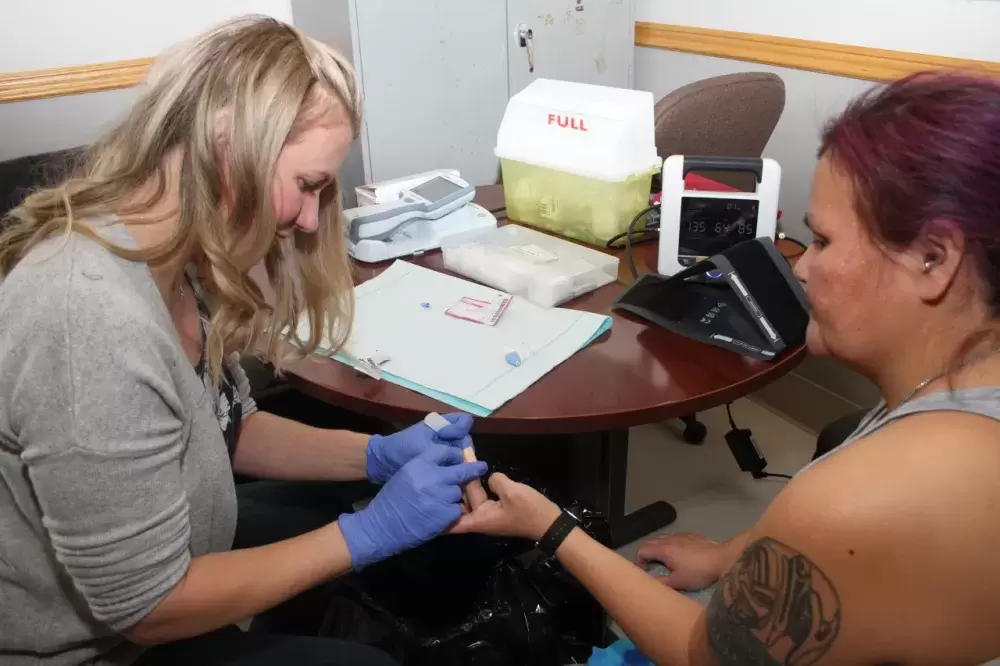A push is underway this year to test the kidney health of more First Nations people – an initiative that will hopefully inform those at risk for a disease that doesn’t present symptoms until it’s advanced stages.
The First Nations Health Authority plans to test 1,000 of B.C.’s Indigenous people this year for risk of chronic kidney disease, a condition that causes dangerous levels of fluid, electrolytes and waste to build up in the body. As part of a collaboration between the Nuu-chah-nulth Tribal Council, FNHA and Can-Solve CKD Network, the initiative aims to check the kidney health of 345 people in Port Alberni alone.
The Port Alberni kidney screenings began in mid February at the Friendship Centre, with one-hour sessions that include a blood pressure test, urine sample, height and weight measurement and blood sampling.
These screenings can be conducted by a family doctor, but challenges to physician access make the kidney check sessions more convenient, said Catherine Turner, Indigenous liaison manager with the Can-Solve CKD Network. Twenty people have already been tested in Kyuquot, and the project plans to hold screenings in other coastal communities like Hitacu, near Ucluelet.
“For more rural and remote First Nations communities, it might not be as simple as going to see the doctor,” said Turner. “Oftentimes there’s bad experiences with the healthcare system and healthcare providers.”
Located near the back just below the ribs, the kidneys filter waste and excess fluid from the blood, which is then converted to urine for excretion. Chronic kidney disease causes the loss of this function, and in its final stage can only be treated by transplant or dialysis.
Failing kidneys are indicated by fatigue, swelling, headaches, restlessness or itchiness, but the disease often progresses without these symptoms until the later stages.
“Kidney disease is painless and silent, so people will have no sign of kidney disease, generally, until their kidney function is as low as 20 per cent or 15 per cent,” said Beth Neilson, a kidney check nurse with Can-Solve. “There aren’t as many options at that point.”
Approximately one in 10 Canadian adults are at risk for kidney disease, but rates are significantly higher for First Nations. Studies indicate 25-30 per cent of the country’s Aboriginal people are at risk, with even higher rates in remote communities. Neilson believes that the negative health impacts of colonization are a factor.
“We know that when people live in more remote communities, it can be more difficult to get access to care,” she added. “They may not have a family doctor that they see all of the time.”
Diabetes is the leading cause of kidney disease, according to Diabetes Canada. Up to half of diabetics will have signs of kidney damage in their lifetime, as elevated blood sugar levels and high blood pressure can damage kidneys and prevent them from functioning properly.
“Kidney disease is closely linked to high blood sugar, high blood pressure and smoking,” states Diabetes Canada.
But Turner notes that recent research indicates there are other factors that can lead to failing kidneys.
“The pathway to chronic kidney disease is not through diabetes,” she said. “One thing that’s been mentioned is autoimmune disorders; there are genetic factors in some circumstances.”
A high-salt diet with lots of processed foods can be hard on the kidneys, as well as daily doses of anti-inflammatory drugs containing ibuprofen like Advil and Motrin as well as Aleve, said Neilson.
“If your kidneys aren’t fully healthy, we want to get you off those medications that are not doing your kidneys any favours,” she said.
For First Nations people, a more traditional diet of fish, berries and plants found in their surrounding territory is preferable.
“Traditional foods are protective for kidneys, also following a diet high in fibre, fruits and vegetables,” said Neilson. “We say half a plate of vegetables, a quarter whole grain and a quarter of protein or meat alternatives.”
Across Canada, the severity of chronic kidney disease appears to be worsening. The rate of end-stage kidney disease increased by 35 per cent over the last decade, according to the Kidney Foundation. The risk grows with age, but 46 per cent of those with the disease are under 65.
To mitigate risk, people are advised to keep their blood pressure within the target range, engage in regular exercise - including going for walks – and drink plenty of water.
“We know that there are a lot of people out there who have chronic kidney disease, who are living with it and not knowing it,” cautioned Neilson. “The sooner we can catch chronic kidney disease, the more options there are for people. We know things like dialysis and transplant can be incredibly impactful for people. Our goal is to prevent anyone from having to go to that point.”







